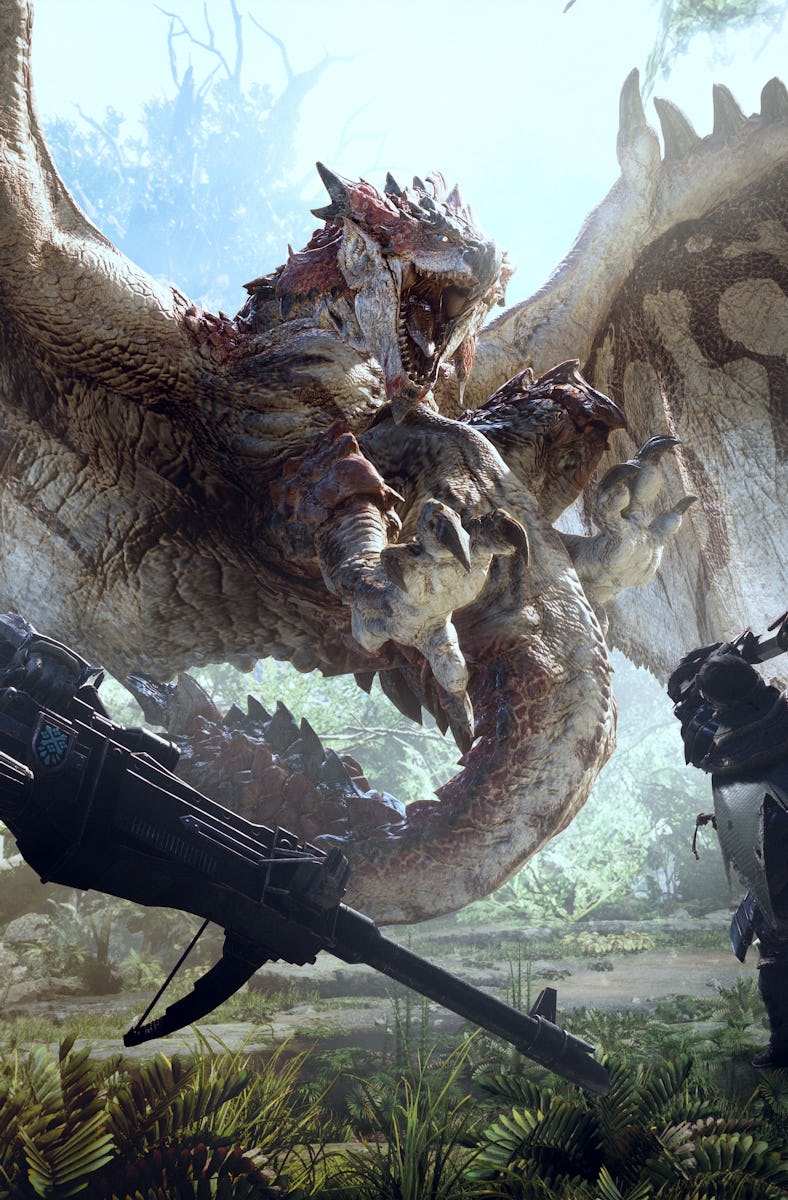19 Years Ago, Monster Hunter Changed Video Games Forever
Gotta crush ‘em all.

It took almost a decade, but Monster Hunter has finally become a global phenomenon.
2018’s Monster Hunter World and its sequel Rise are the most successful games Capcom has ever released, selling a combined 30+ million copies worldwide. The “easy to understand, tough to master” formula of hunting drakes, baboons, bugs, and a rotating assortment of beasts started out as a regional delicacy in Japan. But the series took quite a while to get to its spot at the top of Capcom’s totem pole.
The first Monster Hunter launched on the PlayStation 2 in Japan in March 2004, and already contained the core fundamentals of the franchise. Players take up quests to hunt beasts, gather materials, or just explore. With each successful defeat or capture, you collect materials that can be used to upgrade your weapons, armor, or stats. With the help of your bipedal cat sidekick, known as a Felyne, you can eventually take on the daunting end-game bosses, known as elder dragons.
Monster Hunter World is still Capcom’s most successful title.
The first entry was a pioneer in online play — one of three titles designed by Capcom's Production Studio 1 to test the waters on online-focused games. Players could team up with up to three other hunters to go on exclusive hunts only available for a limited time. Though that’s commonplace in today’s living game ecosystem, it was a rarity back when you needed to plug your PlayStation into a modem.
The game was an immediate success in Japan, quickly becoming one of Capcom’s most successful franchises there. But western audiences were slower to develop an affinity for Kulu-Ya-Ku meat.
Monster Hunter Freedom Unite, a remaster of Monster Hunter 2 for the PSP, sold 3.5 million units in Japan and is still in the top 25 most purchased Capcom games of all time. But in a 2009 financial review, Capcom USA wrote that Freedom Unite “struggled” in the west. Fourteen of the franchises’ titles, including Monster Hunter G, Monster Hunter 2, Monster Hunter: Frontier Online, and Monster Hunter 4, never made it out of Japan in their original forms. Monster Hunter 4 Ultimate didn’t come out in the states until a year and a half after its base release.
“When you look at the history of the Monster Hunter franchise in the west, you can't really say that it's been a huge success," Monster Hunter producer Ryozo Tsujimoto told Polygon in 2013.
It took Monster Hunter 3 quite a bit to come to US shores.
The early Monster Hunter games weren’t particularly friendly to newcomers, with a difficult learning curve and a finicky camera that requires the D-pad to lock on. Players also had to develop an uncomfortable “claw grip” to hold their controllers and PSPs, using their thumb to move the analog stick and their index finger to press the D-pad.
What’s more, some of the best early Monster Hunter games were exclusive to the PlayStation Portable, a handheld device that, while popular, never really had the same cultural impact as the Nintendo DS in the west. Lacking online infrastructure was also a major factor — not everyone in the US had internet fast enough to raid in World of Warcraft, let alone murder monsters in high-stakes combat.
It also didn’t help that Monster Hunter never really had the same cultural recognition as other titles in Capcom’s library. The series never had a singular main character, changing towns and adding beasts with each new entry. Everyone knew who Mega Man and Ryu were, but Rathians and Felynes never managed to reach that level of ubiquity.
There was even a Monster Hunter movie, even if it wasn’t very spectacular.
But all of that changed with the release of Monster Hunter World in 2018. Bringing high-intensity fights to the Xbox, PS4, and PC, allowing a whole new generation of players to jump into the hack-and-slash adventure. You didn’t need to know what all the monsters were, how to rotate your attacks, or even how to use the claw grip. Simplified controls helped newcomers get into the groove, making World the most successful title in Capcom’s history. In response, there was even a Monster Hunter live-action movie in 2020, but the less said about that the better.
Rise has been almost as successful, becoming a staple title on Xbox’s Game Pass while building on the foundation of its predecessors. At its core, it's still just a game about slaying monsters and crafting their parts into gear. It’s very rare to see a franchise’s core gameplay loop remain so similar over a nearly 20-year evolution, but Monster Hunter managed to do it.